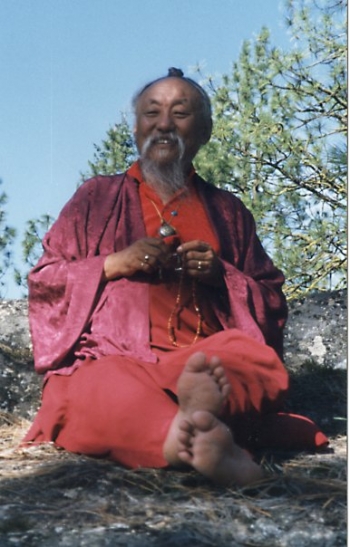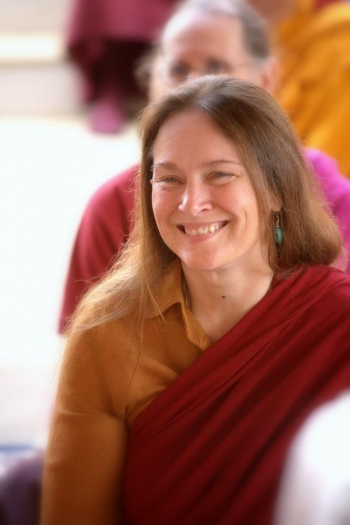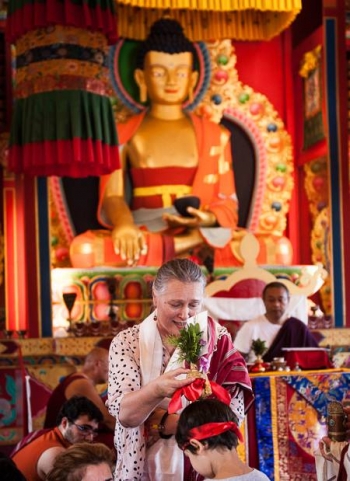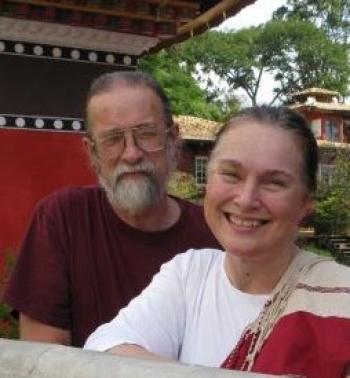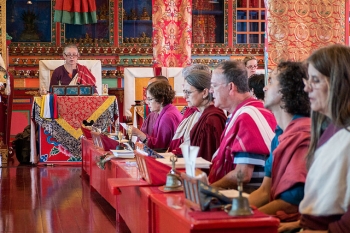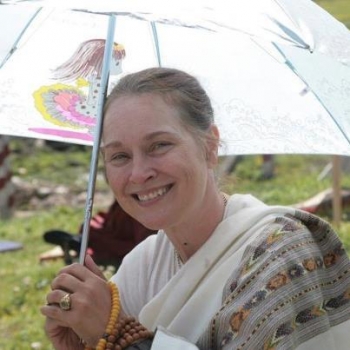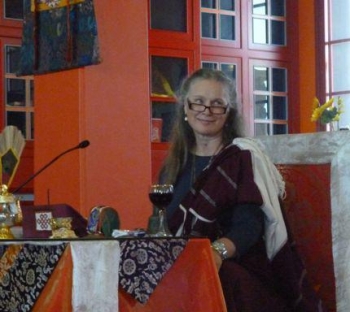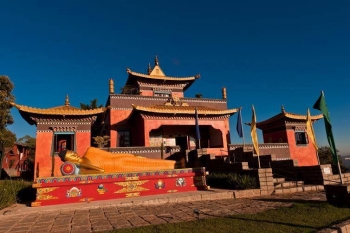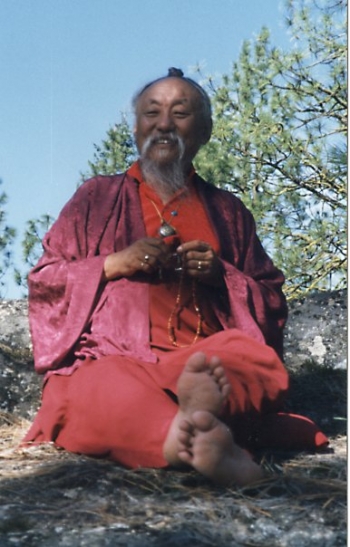Tsering Everest is the resident lama at Chagdud Gonpa Odsal Ling, a Vajrayana Buddhist center in Sao Paulo, Brazil. Originally from the United States, for 11 years she served as the main interpreter for Chagdud Tulku Rinpoche (1930–2002), a high lama from the Nyingma tradition of Tibetan Buddhism who arrived in America in 1979 speaking almost no English. Although Lama Tsering does not speak Tibetan and Rinpoche never learned English well, through a past-life connection she was able to understand and “translate” his teachings, “like being able to see the whole painting from just a few strokes.” Immediately following a four-year solitary retreat under Rinpoche’s guidance, in 1995 he ordained her as a lama and asked her to teach in Brazil, which he had visited and where he subsequently established Chagdud Gonpa Khadro Ling and other centers. While Lama Tsering also has many students in the States and travels there each year, she mostly divides her time between her city center and a peaceful retreat center on Sao Paulo’s outskirts, where she and her husband recently constructed a traditional Tibetan-style temple. This is the second part of an interview in which Frances McDonald talks to Lama Tsering about Vajrayana in the West and the role of tradition.
Frances McDonald: Do you feel that there is a difference in the receptivity to traditional Vajrayana practices in the US and Brazil?
Lama Tsering: I think that each private individual has a difference in their capacity to receive the Dharma—it’s not really totally cultural. Really, it’s personal, and depends on their own karma, their own field of merit, their own capacity. One day someone can be receptive, another day, they can’t. I think receptivity, being able to be open to the Dharma, is really a fruit of great merit. Having said that, in a way I do feel it’s easier to teach in Brazil, although that might just be because I have a karmic connection to these people. But it seems to me that when they get it, however long that takes, they really get it—they don’t continue to ask the same question over and over again. In the States what I’ve noticed is that when people ask the question and get the answer, they are okay for a while, but then the same question surfaces again. Again, maybe it’s just the people that I meet, or that Rinpoche would meet.
FM: The Dharma can be challenging because it goes against the ego. It can make people feel quite insecure.
LT: Yes. It may just be that it’s due to individual obscurations and habits, and the challenge of dealing with our own mind and facing a wisdom that is so profound and counterintuitive. The Dharma is very counterintuitive. Our own intuition is generally very self-centered, and it’s very oriented towards success and happiness for ourselves and our family, and so when we start to face unconditional love, compassion, and the wisdom of the nature of form, sound, and thought, it’s not really very logical for our ordinary mind. And so it takes a tremendous capacity and ripening for a person to be able to really be receptive, and then to really be able to hold it. Sometimes I feel like a chiropractor—you know how when people’s backs go out of place, they have to be put back in place again and again? Some people need to hear the Dharma over and over again, and maybe that’s just what they have to go through at the time.
FM: I guess the more familiar one becomes with the teachings, the easier it gets.
LT: I think that’s really the meaning of practice, isn’t it? Practice is to bring our mind back to the teachings, to bring our mind back to the path . . . On the other hand, if we never leave wisdom, we don’t have to come back. Once, in a very quiet moment when Rinpoche was folding books, I remember him saying, “Isn’t it amazing? Our path is so simple. All we have to do is not forget.” That’s the whole thing—practice is about not forgetting, it’s about instilling the Dharma and deepening it and making it normal, making it our truth. What we expect to be truth isn’t exactly true the way we think.
FM: Did you yourself ever have any resistance to the teachings?
LT: My resistance was always to what I didn’t understand—if I didn’t understand something, I couldn’t do it. And so that kind of made an environment between Rinpoche and I in terms of my relationship with the teachings and listening to the Dharma, because Rinpoche knew quite well that I wasn’t going to do something that I couldn’t understand. Understanding karma and reincarnation was a big issue when I first started in the Dharma. Karma for me was fifty-fifty, you know, maybe karma’s true, maybe karma’s not true? But my logic was sufficient to say, well okay, if karma is not true it won’t matter, but if karma is true, it’ll matter a lot. And so then logically I could say, “Alright, these people who seem to be very ethical and to have great integrity are teaching about karma, and also the Buddha, who I consider to be an authority.” Then I could get over the resistance to some degree with basic instructions and some confidence in the source, and I could begin to practice. Practice is finally what really eliminates resistance, because you then realize there’s something more, which really can’t even be expressed in words. It can only be experienced by meditating.
FM: How about resistance to the traditional Vajrayana approach?
LT: I would say no, that my resistance was more preliminary to the approach. To just do something because it’s a tradition, because it’s a culture, that is a secondary issue based on not understanding what is happening there, like what is really happening with prostrations or mandala offerings. If you think that mandala offerings are just about throwing rice on a pan, how silly is that! How could you do that really wholeheartedly? Once I understood the principles and what was being accomplished, then I didn’t have any resistance at all.
FM: Have you faced many challenges on the path?
LT: Every student has challenges. You have to have challenges, otherwise you’re not meeting the edge of your capacity and your ability and conquering that edge. Whenever you’re staying in the comfort zone you’re not really changing, you’re not really radically growing. You have to meet the edge of your comfort zone and exceed it, and then you grow. So I think everybody has to have challenges, especially on the Vajrayana path and if you’re working closely with a qualified lama. Lamas are very challenging. They have expectations, you can disappoint them, there are all kinds of issues that arise. Dealing with and getting past these challenges and failures is kind of what makes your practice progress.
FM: Did you ever feel like giving up?
LT: One time, I had a conflict with someone in the sangha. It was an interaction that seemed very unpleasant to me, and I thought, “Okay, fine, I don’t need to do this”—as I had done many times before in my life when I faced someone who wasn’t nice to me. My habit pattern was to just go play somewhere else. But that day, I realized that the Dharma was the most important thing I had ever found, and that I couldn’t just go play somewhere else. I thought, “I’m not going to stop doing Dharma just because somebody doesn’t like me, or it’s not easy.” When I decided to stay, I felt like a mountain sitting down—I was not going to move! Although along the way there have been many, many challenges and difficulties, after that, I never gave up.
FM: The situation today is that most practitioners aren't fortunate enough to be able to work closely with a qualified lama. What advice would you give to practitioners struggling with that issue?
LT: I think that it’s marvelous if you have the kind of karma that ripens into having a teacher that you can be close to, but that can lead to its own problems. If you’re around the lama all the time you can start to take the lama for granted, you can start to misuse your opportunities by just not recognizing how important the teacher and the teachings are. Once Rinpoche told a story about a great lama who was teaching in a big tent, and one fellow just walked by and heard four lines of the teaching. He didn’t even get a chance to go into the tent, but he treasured those teachings and the teacher that was their source, and continued to hold them in his heart and mind. Through that he was able to ripen and realize the full benefit of the practice and the lineage, and he was able to even fly in the sky. And one day, the teacher who had been giving the teachings in the tent saw him and started to do prostrations towards this yogi flying in the sky. So then the fellow came down and said, “Oh no! Please don’t do prostrations towards me, you’re my teacher.” And the teacher said, “But I don’t remember you.” The yogi said, “We didn’t meet, but as I walked by your tent, I heard four lines of the teachings and kept them in my heart and practiced them, and as a result I gained this level of realization.” And the teacher, of course, was amazed, and happy.
FM: He really valued the teachings!
LT: So it’s not that you have to hear so much, or have constant access to the guru. You do need to have the opportunity to hear the teachings, but then it’s really a matter of practicing them, using them, and applying what you receive. Even if it’s as little as four lines, it has within it the source to produce full realization if we can apply ourselves to it really well. If our path doesn’t allow us the opportunity to be with a teacher all the time, we still have the opportunity to receive the gurus’ blessings by hearing their teachings and then taking them to heart, holding them dear and carrying them with us and letting them work on us. Then they will change our mind and liberate our ordinary confusion and delusion, exposing the Buddha nature that is inherent and enabling us to be of benefit, beautiful benefit, to all beings.
FM: He really valued the teachings!
LT: So it’s not that you have to hear so much, or have constant access to the guru. You do need to have the opportunity to hear the teachings, but then it’s really a matter of practicing them, using them, and applying what you receive. Even if it’s as little as four lines, it has within it the source to produce full realization if we can apply ourselves to it really well. If our path doesn’t allow us the opportunity to be with a teacher all the time, we still have the opportunity to receive the gurus’ blessings by hearing their teachings and then taking them to heart, holding them dear and carrying them with us and letting them work on us. Then they will change our mind and liberate our ordinary confusion and delusion, exposing the Buddha nature that is inherent and enabling us to be of benefit, beautiful benefit, to all beings.
For further information, see:
